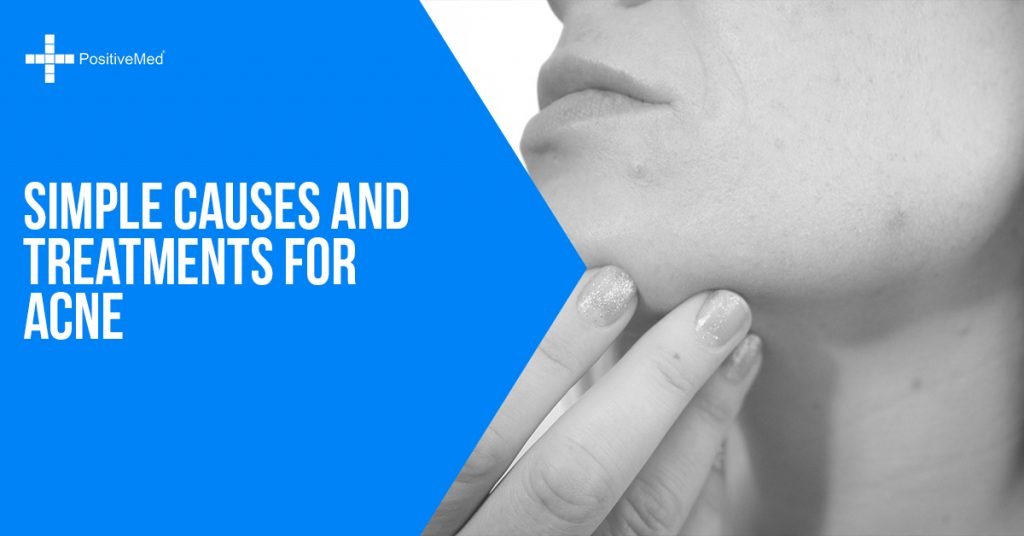Acne is one of the most common ailments that most people share at some point in their lives. Some people have completely clear skin all of their life, but most of us have suffered from moderate to severe acne. The reasons for this are as varied as the people who have them. However, there are a few commonalities between all causes of acne, including environmental and hereditary factors. Here are a few causes and treatments of acne:

Hormones
There is a reason that people generally start breaking out with acne around the time of puberty. Hormones are flooding the body, making the body expand and grow from mere child to full adult. This influx of hormones is at first overwhelming for a smaller adolescent body, and thus can overwhelm the pores. The primary cause of this is a hormone called androgen. Both boys and girls have androgens. Androgens make the skin’s oil glands larger and make more of a chemical called sebum (the oil that hydrates the skin). This also happens when a woman becomes pregnant. Other hormonal factors are not normal and not related to puberty. In this case, extra help from a dermatologist is recommended.
Sun Exposure
You’ve heard it over and over—prolonged sun exposure is not good for the skin. Yet many people subject themselves to harmful rays every summer, causing the potential not only for freckles and increased aging, but for acne as well. However, if that is not enough to get you out of the sun, know that sun exposure can actually make acne worse. There are no conclusive results that the sun will clear up acne, and there is more evidence that for those prone to acne it can make it worse. Often, as the skin darkens, it only hides the pimples, but does not clear them. In fact, inflammation can also occur, which will cause hyperpigmentation of the skin. As always, no matter what you perceive your resilience to be, a layer of at least SPF fifteen is recommended, with reapplication if the skin gets wet.
Stress
Puberty isn’t the only factor that increases levels of the male hormone androgen. Stress also plays a key role. If you always found yourself breaking out around exam times in college, you might understand. As stated earlier, increases in androgen signals sebaceous oil glands to secrete more sebum. The excess oil can develop acne. Stress on the body isn’t just caused by a bad breakup or dinging your car in a minor accident. Stress can be caused by many enjoyable things such as planning a wedding, going out frequently late into the night, or excess exercise. Settling into a healthy routine of good diet, exercise, and adequate sleep are excellent ways to lower stress levels on the body. Not only will signs of aging occur slower, but the likelihood of acne will diminish as well.
Certain Medications
Certain medications such as some forms of birth control can increase the likelihood of acne. It is difficult to narrow which medications will affect you because everyone has a different body chemistry that may be resistant or more susceptible to acne. Features such as genetics and other competing medications can make the likelihood difficult to pinpoint. Fortunately, there is a plethora of medications on the market, thus for whichever ailment you have, you can talk to your doctor or dermatologist about your options.
Dry or Oily Skin
For those with or without acne, many people will still complain of having dry or oily skin. For those—mostly women—who have ailments such as hypothyroidism , dry skin is common and irritating. Because of this, however, many women are prescribed birth control by their gynecologist to improve regularity of periods. Therefore, women with preexisting conditions can still be effected by acne because the skin cannot balance these competing factors. In these scenarios, skin care products with salicylic acid can clear the skin without causing excessive dryness .
Diet
It is said time and again that diet is an important contributor to acne. In the past few decades, for example, increased hormone levels added to dairy, beef, and poultry, are thought to cause acne. Even organic versions have not been proven yet to be helpful. Conversely, vegetarians don’t seem to have it better either. There is evidence to suggest that lack of adequate protein and iron can have a significant impact on skin, unless a strictly regimented diet designed for your body is performed.









